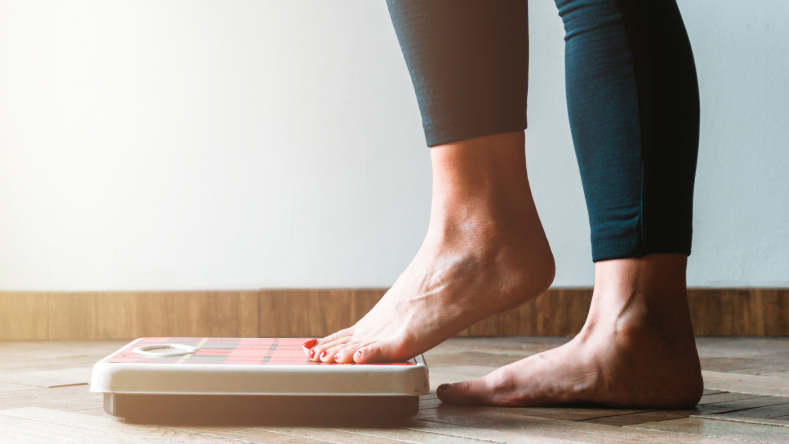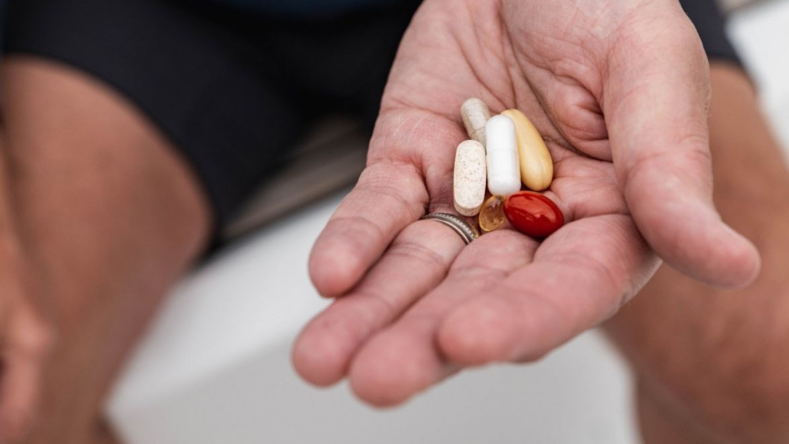10 science-backed benefits of health coaching
Health coaches are often seen as wellness champions who can help you navigate difficult diet, lifestyle, and behavioral changes. But is health coaching all it’s cracked up to be? From accountability to improved quality of life, here’s what science has to say about the benefits of health coaching.

Contents
What is health coaching? What to look for in a health coach #1: Health coaching can help you improve your diet. #2: Health coaching can motivate you to move more. #3: Health coaching can help you better understand your health. #4: Health coaching can boost weight loss. #5: Health coaching can improve cholesterol and blood pressure levels. #6: Health coaching can help you achieve better blood sugar control. #7: Health coaching can provide more accurate recommendations. #8: Health coaching can improve overall medical care. #9: Health coaching can help keep you accountable. #10: Health coaching improves quality of life. Summary Key takeawaysWith obesity, addiction, and chronic disease on the rise, an increasing number of Americans are looking to take better control of their health. Whether it’s ditching bad habits, adopting new eating patterns, or simply moving more, there are many ways to elevate your wellness game. However, it can be difficult to make these changes on your own, which is why many people are turning to health coaches to help them reach their goals.
Health coaches are often seen as wellness champions who are experts on human behavior, health, and motivation. And while they offer a one-on-one experience that can help you navigate difficult diet, lifestyle, and behavioral changes, how do you know if these experts are really worth your time?
Before exploring what science has to say about the perks of health coaching, let’s start by understanding how it works and what you should look for when it comes to credentials.
What is health coaching?
Health coaching is a practice that examines wellness as a whole by evaluating lifestyle and dietary factors [ 25
What to look for in a health coach
Health coaches often act as your personal cheerleader who provides you with the knowledge, skills, tools, and confidence you need to take charge of your care and well-being. But how can you find the right one for you? Here’s what you should look for in a health coach.
Credentials. Anyone can call themselves a health coach–even someone without formal training or education–so you should look for people who are credentialed and have expertise in this area. For instance, someone who is a National Board-Certified Health and Wellness Coach (NBC-HWC) has completed an approved health coaching program and met the minimum education, training, and certification requirements set by the National Board of Health and Wellness Coaches. Other qualified health professionals (like Registered Dietitian Nutritionists, personal trainers, or other experts) can also work as health coaches.
Good rapport. Make sure you feel comfortable with and connected to your health coach. Without personal connection, trust, and good rapport, your coaching sessions will feel unproductive and possibly uncomfortable.
At Elo, we have four health coaches (
Alayna
,Jessica
,Kelley
, andCaila
) who are also Registered Dietitian Nutritionists.
Science-backed benefits of health coaching
Whether you want to lose weight, improve your diet, quit smoking, reduce stress, or feel confident in managing a health condition, our Elo health coaches can help you succeed. Here are ten science-backed benefits of health coaching, and how we utilize them at Elo.

#1: Health coaching can help you improve your diet.
Health coaches can help you navigate challenging dietary changes and improve your diet. In fact, studies show that people who have a health coach tend to eat more health-boosting fruits and vegetables and less unhealthy fats compared to people who don’t have a coach [ 1
Whether you want to avoid gluten, eat fewer refined carbs, or eat out less, your Elo health coach is there to provide small, tangible changes to help you reach your goals. This could include adding an extra vegetable each day, eating at home an extra day per week, or prioritizing protein at meal times to enhance satiety. Our health coaches also discuss any barriers that may prevent you from making these changes, and continue to modify their suggestions based on your lifestyle and dietary preferences.

#2: Health coaching can motivate you to move more.
The Department of Health and Human Services recommends at least 30 minutes of moderate physical activity/day, 150 minutes of moderate aerobic activity/week, or 75 minutes of vigorous exercise/week for improved health and wellness [ 28 2 3
Research shows health coaching can help people to be more physically active, as those who receive health coaching have been found to log significantly higher step counts or minutes of physical activity compared to those who did not have health coaching [ 2 4
Elo health coaches can provide an additional layer of motivation and accountability if you find it difficult to make physical activity part of your regular routine.
#3: Health coaching can help you better understand your health.
From diet and lifestyle changes to managing doctor's visits, lab tests, and medications, healthcare can be daunting — not to mention complicated. And since the internet is fraught with nutrition misinformation, it can be hard to sort through the noise and come to a sound conclusion. That’s why our Elo health coaches do the heavy lifting for you–they make sense of the messy world of nutrition science and your personal health data to recommend the right nutrition and supplements for your needs.
Elo health coaches also draw connections between your blood test results, your lifestyle, and your priorities to identify where nutrition and supplements can have the most impact. Each time you meet with your health coach, you will leave with a solid understanding of what your biomarkers mean, their trends, and how each supplement in your precision packet is targeting them.
The goal with Elo health coaching is for you to understand why certain supplements are in your daily packet and how they work so you can have a better knowledge of your body’s needs.

#4: Health coaching can boost weight loss.
If you’re looking to shed some pounds, numerous studies have shown that health coaching can help you lose weight and keep it off.
Notable research indicates that people who received one coaching call per week achieved significant weight loss and reductions in body mass index and waist circumference compared to those who didn’t receive coaching [ 5 6 7
Additionally, studies show that health coaching can be beneficial to obese individuals who want to lose weight–those who received health coaching consumed 147 fewer calories/day after six months and had more significant weight loss than those who did not receive coaching [ 2 19
At Elo, our health coaches help you with your weight loss goals by using a well-rounded approach that focuses on diet and lifestyle behaviors. For instance, our health coaches may suggest eliminating inflammatory foods, prioritizing protein, incorporating daily movement, and improving sleep habits, as these are all positive and sustainable habits that have enormous health benefits beyond the scale. Additionally, they encourage you to aim for progress, not perfection, which is why tracking non-scale goals (like better mood, energy, and sleep) can prove beneficial.
#5: Health coaching can improve cholesterol and blood pressure levels.
Research shows that health coaching can help improve heart health, as people who received coaching have been found to experience a reduction in total cholesterol levels LDL cholesterol 8 22
The Elo health coaches will evaluate your diet, lifestyle, and biomarker results and create recommendations based on your results. Whether it’s adding more fiber-rich foods, limiting refined carbohydrates, avoiding trans-fats, recommending certain supplements, or increasing physical activity, they can create a plan that works for you and your cholesterol needs. Your health coach will also continue to evaluate your health and modify their recommendations as needed.
#6: Health coaching can help you achieve better blood sugar control.
Health coaching might help people with type 2 diabetes to better control their blood sugar.
One study found type 2 diabetics who received weekly telephone coaching significantly reduced their HbA1c levels 9
Other research indicates that people who received six months of health coaching had greater self-efficacy, metabolic control, improved knowledge, and better clinical outcomes than those given usual care [ 20 21
Elo health coaches can make changes to your diet and help you adopt healthier habits to lower your HbA1c. Physical activity, dietary suggestions, stress management, and weight loss are just a few ways that your health coach can help improve your HbA1c levels. They may also suggest certain supplements to help with blood sugar control
#7: Health coaching can provide more accurate recommendations.
It can be easy to answer a generic health questionnaire online, but you reap what you sow. Oftentimes, these shallow assessments miss a lot of information (like medications, daily routines, and dietary practices), and will provide a vanilla response that doesn’t offer specific details regarding your individual health and wellness goals. This is problematic, because nutrition isn�’t a “one size fits all”; your body is unique, and your nutrition plan should be, too.
At Elo, we understand that there is more to you than just a piece of paper. That’s why our health coaches are interested in the whole picture: by understanding your goals, dietary routines, family history, specific health concerns, and lifestyle habits, it allows them to make more accurate and personalized recommendations that are unique to you.
These recommendations are backed by science, not some arbitrary rule, which means that a combination of blood testing, questionnaires, and tracking data (such as Apple Healthkit

#8: Health coaching can improve overall medical care.
When managing a chronic condition, taking your meds can keep you out of trouble, yet many still struggle with medication adherence. It is estimated that medication nonadherence accounts for around 125,000 deaths and up to 25% of hospitalizations annually in the United States [ 10
Several studies show health coaching can significantly improve medication adherence and reduce hospitalization admissions, particularly among those with complex chronic diseases like diabetes, asthma, and COPD [ 11 12 13 14 remember to take your daily supplements
There is also evidence that health coaching can be cost-effective and even reduce healthcare costs. One study on high-risk insurance plan enrollees found four weeks or more of health coaching led to significant reductions in outpatient and total expenditures, with estimated outpatient and total cost savings of $286 and $412/person/month, respectively [ 15
#9: Health coaching can help keep you accountable.
Making a positive change is much easier when there is someone in your corner rooting for you, as studies show that only 4% of people are likely to complete a goal on their own when compared to 95% of people who have an accountability partner [ 26 27
Take smoking for instance–this is a notoriously hard habit to break, as only about 10% of people who try to quit on their own succeed [ 16 16 17 18
At Elo, our health coaches are your built-in accountability buddy, as they utilize emails and follow-up calls to communicate with you and further understand how you’re feeling. While these regular check-ins can help keep you accountable, the health coaches have found that members who communicate more frequently have better success rates.
#10: Health coaching improves quality of life.
As previously mentioned, health coaching has been shown to result in significantly improved biomarker risk factors (like systolic and diastolic blood pressure, total cholesterol, LDL and HDL cholesterol, triglycerides, fasting glucose, body weight, body mass index, waist circumference, and cardiorespiratory fitness) that can greatly improve your quality of life [ 23
Additionally, research has found that health coaches have a positive impact on people’s depressive symptoms, social aspects, psychological health, and perceived stress levels [ 24
Summary
Health coaches are experts on human behavior that can help you navigate specific diet, lifestyle, and behavioral changes. While they can help improve your overall health, it’s important that you work with a qualified person who also makes you feel at ease. At Elo, we have four health coaches who can help you reach your health and wellness goals. Whether you’re looking to improve your diet, increase physical activity, quit smoking, or lower your cholesterol levels, our health coaches can help you gain the knowledge, skills, tools, and confidence you need to take charge of your health and well-being.
Disclaimer: The text, images, videos, and other media on this page are provided for informational purposes only and are not intended to treat, diagnose or replace personalized medical care.
Note: this article was written in collaboration with Elle Penner, MPH, RDN
Key takeaways
Health coaches are experts on human behavior, health, and motivation who can help you take charge of your health and make important health-related behavior changes.
Anyone can call themselves a health coach, so look for health coaches who are qualified experts and who you have a good connection with.
Health coaching has been shown to help with weight loss, blood sugar control, cholesterol levels, physical activity, and quality of life.
Our Elo health coaches are also Registered Dietitian Nutritionists, and work with you to establish positive diet and lifestyle behaviors that correlate with your health goals.
References
Kennel J. (2018). Health and Wellness Coaching Improves Weight and Nutrition Behaviors. American journal of lifestyle medicine, 12(6), 448–450.
https://doi.org/10.1177/1559827618792846
Gierisch, J. M., Hughes, J. M., Edelman, D., Bosworth, H. B., Oddone, E. Z., Taylor, S. S., Kosinski, A. S., McDuffie, J. R., Swinkles, C., Razouki, Z., & Masilamani, V. (2017, April). The Effectiveness of Health Coaching (Project #09-010). U.S. Department of Veterans Affairs.
https://www.hsrd.research.va.gov/publications/esp/health-coaching-REPORT.pdf
Move More; Sit Less. (2022, June 2). Centers for Disease Control and Prevention. Retrieved July 13, 2022, from
https://www.cdc.gov/physicalactivity/basics/adults/index.htm
Oliveira, J. S., Sherrington, C., Amorim, A. B., Dario, A. B., & Tiedemann, A. (2017). What is the effect of health coaching on physical activity participation in people aged 60 years and over? A systematic review of randomised controlled trials. British journal of sports medicine, 51(19), 1425–1432.
https://doi.org/10.1136/bjsports-2016-096943
Kempf, K., Röhling, M., Stichert, M., Fischer, G., Boschem, E., Könner, J., & Martin, S. (2018). Telemedical Coaching Improves Long-Term Weight Loss in Overweight Persons: A Randomized Controlled Trial. International journal of telemedicine and applications, 2018, 7530602.
https://doi.org/10.1155/2018/7530602
Leahey, T. M., & Wing, R. R. (2013). A randomized controlled pilot study testing three types of health coaches for obesity treatment: Professional, peer, and mentor. Obesity (Silver Spring, Md.), 21(5), 928–934.
https://doi.org/10.1002/oby.20271
Sherwood, N. E., Jeffery, R. W., Welsh, E. M., Vanwormer, J., & Hotop, A. M. (2010). The drop it at last study: six-month results of a phone-based weight loss trial. American journal of health promotion : AJHP, 24(6), 378–383.
https://doi.org/10.4278/ajhp.080826-QUAN-161
Vale, M. J., Jelinek, M. V., Best, J. D., & Santamaria, J. D. (2002). Coaching patients with coronary heart disease to achieve the target cholesterol: a method to bridge the gap between evidence-based medicine and the "real world"--randomized controlled trial. Journal of clinical epidemiology, 55(3), 245–252.
https://doi.org/10.1016/s0895-4356(01)00460-7
MacLean, L. G., White, J. R., Broughton, S., Robinson, J., Shultz, J. A., Weeks, D. L., & Willson, M. N. (2012). Telephone Coaching to Improve Diabetes Self-Management for Rural Residents. Clinical Diabetes, 30(1), 13–16.
https://doi.org/10.2337/diaclin.30.1.13
Kim, PharmD, BCPS, BCACP, CPP, J. (2018, January 19). Medication Adherence: The Elephant in the Room. U.S. Pharmacist. Retrieved July 14, 2022, from
https://www.uspharmacist.com/article/medication-adherence-the-elephant-in-the-room
Olsen, J. M., & Nesbitt, B. J. (2010). Health coaching to improve healthy lifestyle behaviors: an integrative review. American journal of health promotion : AJHP, 25(1), e1–e12.
https://doi.org/10.4278/ajhp.090313-LIT-101
Fisher, E. B., Strunk, R. C., Highstein, G. R., Kelley-Sykes, R., Tarr, K. L., Trinkaus, K., & Musick, J. (2009). A Randomized Controlled Evaluation of the Effect of Community Health Workers on Hospitalization for Asthma. Archives of Pediatrics & Adolescent Medicine, 163(3), 225.
https://doi.org/10.1001/archpediatrics.2008.577
Long, H., Howells, K., Peters, S., & Blakemore, A. (2019). Does health coaching improve health-related quality of life and reduce hospital admissions in people with chronic obstructive pulmonary disease? A systematic review and meta-analysis. British journal of health psychology, 24(3), 515–546.
https://doi.org/10.1111/bjhp.12366
Thom D. H. (2019). Keeping Pace with the Expanding Role of Health Coaching. Journal of general internal medicine, 34(1), 5–6.
https://doi.org/10.1007/s11606-018-4730-1
Jonk, Y., Lawson, K., O'Connor, H., Riise, K. S., Eisenberg, D., Dowd, B., & Kreitzer, M. J. (2015). How effective is health coaching in reducing health services expenditures?. Medical care, 53(2), 133–140.
https://doi.org/10.1097/MLR.0000000000000287
Sforzo, G. A., Kaye, M., Ayers, G. D., Talbert, B., & Hill, M. (2014). Effective Tobacco Cessation via Health Coaching: An Institutional Case Report. Global advances in health and medicine, 3(5), 37–44.
https://doi.org/10.7453/gahmj.2014.029
Eddie, D., Hoffman, L., Vilsaint, C., Abry, A., Bergman, B., Hoeppner, B., Weinstein, C., & Kelly, J. F. (2019). Lived Experience in New Models of Care for Substance Use Disorder: A Systematic Review of Peer Recovery Support Services and Recovery Coaching. Frontiers in psychology, 10, 1052.
https://doi.org/10.3389/fpsyg.2019.01052
Sandoval, A. (2022, March 29). What Is a Recovery Coach? Can They Really Help You? Alcohol Rehab Help. Retrieved July 14, 2022, from
https://alcoholrehabhelp.org/treatment/recovery-coach/
Valentin Ayala, R., & Bernstein, J. (2020). Changing Weight Management Self-efficacy Among Obese Puerto Rican Adults: A Quantitative Study using a Health Coaching Intervention. Internet Journal of Allied Health Sciences and Practice.
https://doi.org/10.46743/1540-580x/2020.1867
Chen, R. Y., Huang, L. C., Su, C. T., Chang, Y. T., Chu, C. L., Chang, C. L., & Lin, C. L. (2019). Effectiveness of Short-Term Health Coaching on Diabetes Control and Self-Management Efficacy: A Quasi-Experimental Trial. Frontiers in public health, 7, 314.
https://doi.org/10.3389/fpubh.2019.00314
Brown S. A. (1990). Studies of educational interventions and outcomes in diabetic adults: a meta-analysis revisited. Patient education and counseling, 16(3), 189–215.
https://doi.org/10.1016/0738-3991(90)90070-2
Singh, H. K., Kennedy, G., & Stupans, I. (2021). A Pilot Australian Pharmacist Health Coaching Trial of Participants with Poorly Controlled Hypertension: A Qualitative Study of Participants' and Coaches' Experiences. Patient preference and adherence, 15, 127–140.
https://doi.org/10.2147/PPA.S29040
Gordon, N. F., Salmon, R. D., Wright, B. S., Faircloth, G. C., Reid, K. S., & Gordon, T. L. (2016). Clinical Effectiveness of Lifestyle Health Coaching: Case Study of an Evidence-Based Program. American journal of lifestyle medicine, 11(2), 153–166.
https://doi.org/10.1177/1559827615592351
Clark, M. M., Bradley, K. L., Jenkins, S. M., Mettler, E. A., Larson, B. G., Preston, H. R., Liesinger, J. T., Werneburg, B. L., Hagen, P. T., Harris, A. M., Riley, B. A., Olsen, K. D., & Vickers Douglas, K. S. (2014). The Effectiveness of Wellness Coaching for Improving Quality of Life. Mayo Clinic Proceedings, 89(11), 1537–1544.
https://doi.org/10.1016/j.mayocp.2014.04.028
hortonj4. (2021, November 17). Health coaches: What they do - and how they can help you. Cleveland Clinic. Retrieved July 14, 2022, from
https://health.clevelandclinic.org/what-is-a-health-coach/
Norcross, J. C., Mrykalo, M. S., & Blagys, M. D. (2002). Auld lang syne: success predictors, change processes, and self-reported outcomes of New Year's resolvers and nonresolvers. Journal of clinical psychology, 58(4), 397–405.
https://doi.org/10.1002/jclp.1151
Oussedik, E., Foy, C. G., Masicampo, E. J., Kammrath, L. K., Anderson, R. E., & Feldman, S. R. (2017). Accountability: a missing construct in models of adherence behavior and in clinical practice. Patient preference and adherence, 11, 1285–1294.
https://doi.org/10.2147/PPA.S135895
Edward R. Laskowski, M. D. (2021, September 22). How much exercise do you really need? Mayo Clinic. Retrieved July 15, 2022, from
https://www.mayoclinic.org/healthy-lifestyle/fitness/expert-answers/exercise/faq-20057916







